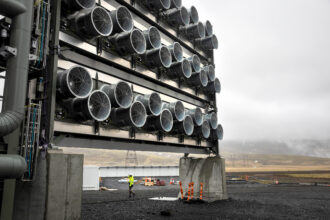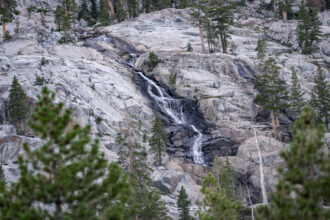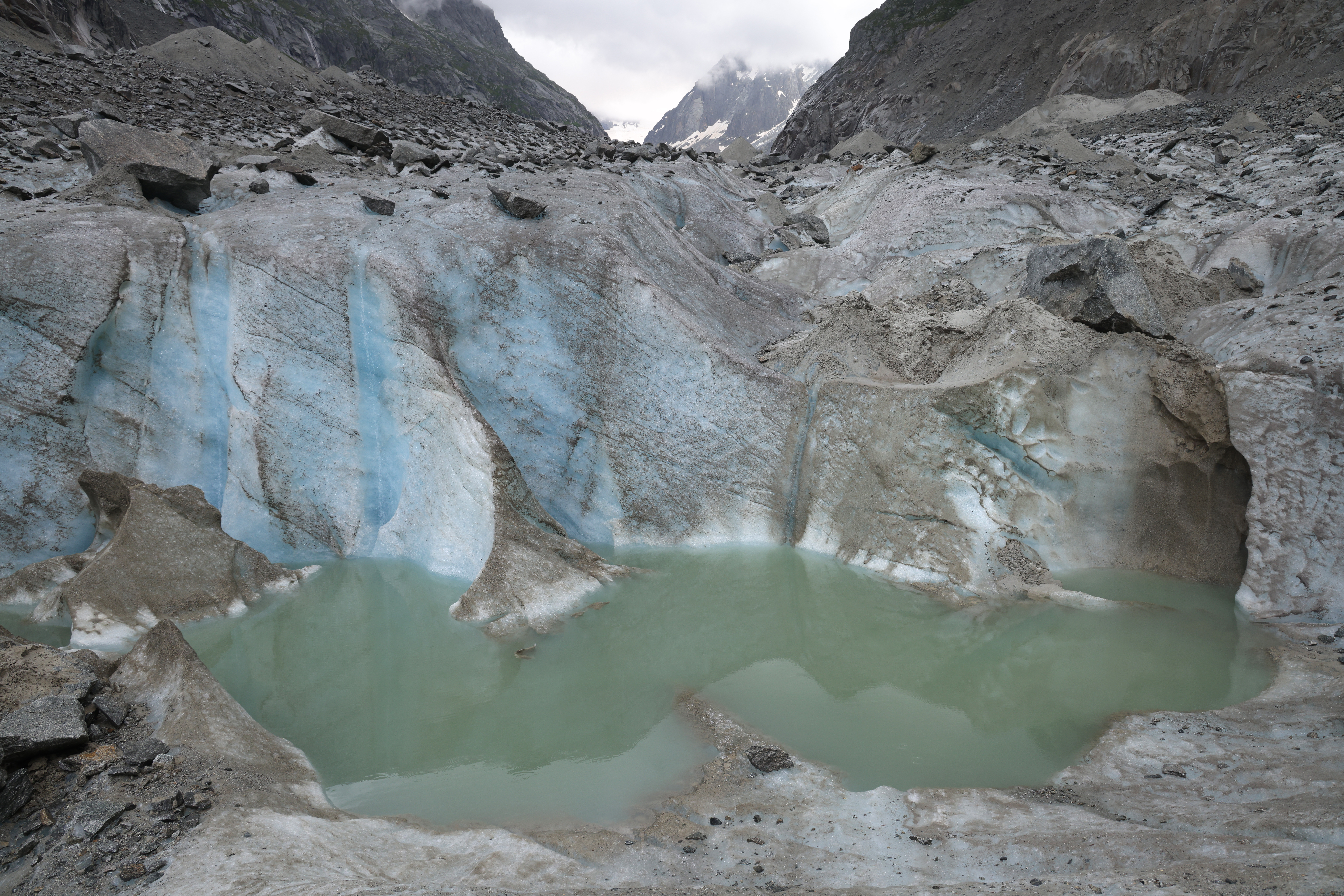The Democratic National Convention commenced yesterday in Chicago, where roughly 4,000 delegates from around the U.S. are gathered to officially recognize Vice President Kamala Harris as the Democratic nominee for the upcoming election.
Throughout the week, Democrats will work to drum up energy around her campaign and discuss key issues in the party’s platform, which was approved last night.
So where does climate change fit into the mix? While the DNC’s full schedule has not been released, climate elements will be threaded throughout the agenda and potentially take center stage on one of the convention’s nights, E&E News reports.
Harris’s official strategy to shrink the U.S.’s massive carbon footprint is still a bit of a mystery, but breadcrumbs in the leadup to this event point to her future climate plans, experts say.
Climate Platform: Last night, President Joe Biden passed the metaphorical baton to Harris in an emotional speech, during which he pointed to the administration’s legacy on climate change. Harris has not yet released her own plan to cut emissions despite pressure to detail her policy goals.
However, her past record as a prosecutor and environmental justice advocate has climate voters rallying around her. My colleague Marianne Lavelle recently wrote about why Harris has invigorated the climate movement, and that voters should “expect a Harris presidency to follow closely in the footsteps of the Biden presidency, setting ambitious goals to reduce climate pollution, but using carrots more than sticks to hasten a clean energy transition.”
This Biden-esque approach is quite literally reflected in the DNC’s newly approved platform, which still references the president’s potential “second term” despite Harris taking over the ticket. Nonetheless, the platform dedicates an entire chapter to tackling the climate crisis and accelerating the clean energy transition. The section repeatedly touts a “clean energy boom” triggered during the Biden-Harris administration and points to more specific strategies to sustain this growth.
“Going forward, Democrats will keep working to incentivize investment in transmission upgrades and new lines, and in the grid-component manufacturing that’s needed to support that growth,” the platform reads. “We will improve and speed up the processes of environmental review and clean-energy permitting; and further scale up development of clean energy on public lands.”
The platform also states that Democrats will continue to crack down on pollution by “repairing damage done by Trump’s failed oversight, and making polluters pay.” Harris has experience in this arena: As attorney general of California, she sued big oil companies over their impact on groundwater, securing multimillion-dollar settlements in 2015 and 2016 from Phillips 66, ConocoPhillips and BP.
During her presidential run in 2020, Harris called for a ban on natural gas fracking, which she has since gone back on, to the dismay of some environmentalists. Former President Donald Trump has called out Harris’ past anti-fracking stance as he campaigns in Pennsylvania, which is the second-largest natural gas producer in the country, The Associated Press reports.
On July 8, the Republican Party released its own platform, which does not mention climate change once.
DNC Schedule: Convention organizers told E&E News that Wednesday’s programming will include speeches from Sens. Ed Markey (D-Mass.) and Jeff Merkley (D-Ore.), both ardent climate advocates. From the industry side, power company Invenergy will be the DNC’s “clean energy sponsor,” while United Airlines will ramp up its messaging around sustainable aviation fuel for the many travelers flying in and out of Chicago. My recent newsletter explains what sustainable aviation fuels are and why they are struggling to take off, if you want to read more.
Representatives from the American Petroleum Institute and ExxonMobil will also be joining several events, though as you can imagine, not everyone is pleased with their presence, E&E reports.
Environmental organizations such as Climate Power, the Natural Resources Defense Council Action Fund and the League of Conservation Voters will be in attendance and have organized their own events to run alongside other DNC programming. Many climate groups have thrown their political and sometimes financial weight behind Harris’ campaign in recent weeks. The New York Times reported that several environmental organizations have organized a $55 million advertising campaign for Harris, primarily emphasizing the economic gains that come with increased environmental policies (the first three ads don’t even mention climate change).
Climate Voters: In the leadup to the DNC, the Harris campaign organized a virtual “Climate Voters for Harris” fundraising event last Friday, coinciding with the second anniversary of Biden’s signing of the Inflation Reduction Act, the largest climate law in U.S. history.
The event—which had roughly 600 listeners—featured a variety of star-studded speakers and climate heavyweights, including Bill Nye the Science Guy, Washington Gov. Jay Inslee and former international climate envoy John Kerry. The event’s panels were largely about increasing social media engagement, raising money and improving messaging around climate achievements, which has been a weak point for Democrats, as I wrote about in a recent newsletter.
Several of the speeches centered around urgency and short timelines—both to reduce emissions before it’s too late and to garner support and votes for Harris during her condensed campaign.
“We’ve seen in the last weeks, obviously, this incredible surge of energy into the campaign,” Kerry said during the event. “But we also know that you can’t waste a day.”
More Top Climate News
During a heat wave, disabled people are often the most at risk, research shows. STAT’s Timmy Broderick recently interviewed five people living across the U.S. who are contending with unique threats from extreme heat due to their disabilities—from a man struggling to walk on his prosthetic leg during warm summer days to a woman with an immune disorder that disrupts her internal body temperature.
In Rodanthe, North Carolina, a beach house recently collapsed and was pulled out to sea, likely due to large ocean swells from Hurricane Ernesto. This is the seventh collapse of its kind in Rodanthe in the past four years, sparking concern for many homeowners in the area. Some have tried to reinforce their houses against storm surge, while others have decided to relocate altogether, 13 News Now reports.
As climate change makes lightning and storms more common, activists in India are pushing for more awareness campaigns and government protection, Wired reports. Each year, between 2,000 to 3,000 people in India die from lightning, but scientists still don’t fully understand how these energy blasts form and behave. Now, locals are working to spread knowledge on how to protect people during lightning storms.
Meanwhile, severe flooding in Connecticut killed at least two people and displaced more than 100. Roads and houses are still submerged in many western parts of the state.
“We are talking about rainfall, in some areas, in the 1,000-year level. So we’re talking anywhere from 25-year level, 100-year level, 500-year level, up to 1,000-year level,” said Brenda Bergeron, deputy commissioner of the state’s Department of Emergency Management and Homeland Security. “So it’s really historic, unprecedented flooding.”
In California, firefighters have made significant headway in tamping down the state’s fourth-largest wildfire ever, The Associated Press reports. As of Monday, the Park Fire was 53 percent contained, but not before it managed to burn around 670 square miles of land. NBC News’ Evan Bush recently interviewed four people whose homes burned down in the fire, after their former homes also burned down in a 2018 California blaze.
About This Story
Perhaps you noticed: This story, like all the news we publish, is free to read. That’s because Inside Climate News is a 501c3 nonprofit organization. We do not charge a subscription fee, lock our news behind a paywall, or clutter our website with ads. We make our news on climate and the environment freely available to you and anyone who wants it.
That’s not all. We also share our news for free with scores of other media organizations around the country. Many of them can’t afford to do environmental journalism of their own. We’ve built bureaus from coast to coast to report local stories, collaborate with local newsrooms and co-publish articles so that this vital work is shared as widely as possible.
Two of us launched ICN in 2007. Six years later we earned a Pulitzer Prize for National Reporting, and now we run the oldest and largest dedicated climate newsroom in the nation. We tell the story in all its complexity. We hold polluters accountable. We expose environmental injustice. We debunk misinformation. We scrutinize solutions and inspire action.
Donations from readers like you fund every aspect of what we do. If you don’t already, will you support our ongoing work, our reporting on the biggest crisis facing our planet, and help us reach even more readers in more places?
Please take a moment to make a tax-deductible donation. Every one of them makes a difference.
Thank you,












